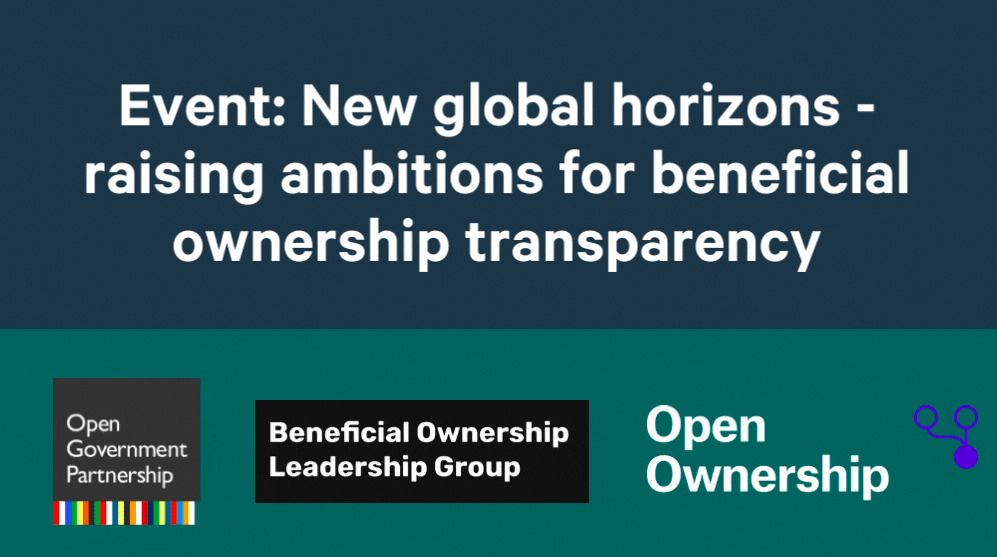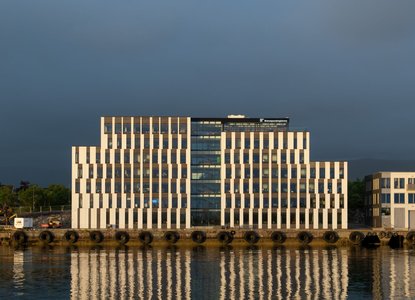New global horizons: Leaders from four continents explain why and how to advance beneficial ownership transparency

The past few years have been turbulent, with 2022 absolutely no exception. A global pandemic, Russia’s invasion of Ukraine, rising inequality and the climate emergency have reverberated around the world, sending shockwaves through our economic, political, food and energy systems.
These events have underlined the reasons to keep the momentum growing to deliver company ownership transparency reforms around the world and cement global norms in the process.
With all this in mind, on 13 July 2022, Open Ownership and the Open Government Partnership convened global and national actors from government and civil society through the Beneficial Ownership Leadership Group. This high level discussion reflected on progress and challenges so far in making beneficial ownership transparency (BOT) a reality.
Matthew Valencia, Special Assignments Editor at The Economist, chaired this panel, setting the scene by reminding how “tackling corruption and its corrosive effects depends crucially on knowing who is behind companies, trusts, and other vehicles,” and highlighting that “there are few global policy issues that are more important” right now.
The event heard from government members of the Beneficial Ownership Leadership Group and provided a platform for emerging leaders to share experience too. The convening featured insights from the governments of Armenia, Indonesia, Nigeria, Slovakia, the United Kingdom, and from the first public intervention of the new U.S. Government Coordinator on Global Anti-Corruption.
Over 100 governments have committed to strengthening BOT, highlighted Joe Powell, Deputy Chief Executive Officer of the Open Government Partnership, in his welcoming remarks. He linked the role of the Beneficial Ownership Leadership Group accelerating global progress with the prominence of BOT in the U.S. Summit for Democracy and the newly launched Financial Transparency and Integrity Cohort of the Summit. These two forums are complementary ways to increase focus on effective implementation, raising ambition, and sharing lessons between countries, he added. So, collectively, how do we move from commitments to action and deliver impact for citizens across the world?
Ensuring greater transparency in real estate ownership to tackle kleptocracy
Duncan Tessier, Director of Economic Crime at the UK Home Office, explained that “companies don’t have to choose between the ease of doing business and fighting kleptocracy and economic crime”, as the UK’s experience showed many benefits for companies to share information, including a safer business environment. Six years after setting up a corporate register of beneficial ownership, the UK is taking action to improve the quality of information in this register - a long identified weakness - through an upcoming bill to give more power to the company registrar to verify data. Mr Tessier also discussed the UK’s new Register of Overseas Entities, highlighting its purpose to help track corrupt elites by making information about the owners of UK real estate public.
Progress on transparency in the real estate sector is also happening in the United States, where the government released the first ever U.S. strategy on countering corruption alongside the first Summit for Democracy in December 2021. “Effectively collecting beneficial ownership information and increasing transparency in real estate transactions is going to make it harder for criminals to launder the proceeds of corruption and other crimes through the U.S. financial system and make it easier for law enforcement to hold them accountable when they do” explained newly appointed Global Anti-Corruption Coordinator Richard Nephew, from the Department of State.
Equipping civil society and the media to use the data
From a European perspective, Armenia’s Deputy Minister of Justice Yeranuhi Tumanyants provided an overview of her country’s past ten years of implementation, which has been at the forefront of using BOT to advance open governance. This included addressing legal loopholes, working in collaboration with the Extractive Industries Transparency Initiative (EITI) to require metal mining companies to share comprehensive information about their owners, then expanding BOT to other sectors.
Between January 2021 and 2022, the number of declarations by companies increased by more than four times, explained the Deputy Minister. Yet, she drew attention to remaining challenges including gaps in how much journalists and institutions analysing and using the data know how to do so.
The Ministry of Justice of Slovakia – another leader in BOT - echoed how crucial it is to support data users: in all cases of “conflicts of interest between politicians and businesses providing goods and services to the state (…) law enforcement efforts were triggered by interventions from civil society or the wider public. So, the most important recommendation from Slovakia is to collect verified beneficial ownership data and keep it accessible to the public for free, online”, she stressed in a written statement.
Coordinating stronger global action to track down Russian assets
Addressing challenges to effective BOT is especially timely in the light of the war in Ukraine. It can be used to uncover opaque corporate structures and links with the Russian war machine. In Ukraine, YouControl has been trying to address some of these challenges with the innovative Russian Asset Tracker, which was demoed during the event. The Russian Asset Tracker uses big data from 26 countries to support governments, NGOs, businesses and investigative journalists to find information about individuals and companies with Russian connections.
Civil society representatives from Ukraine and Slovakia called for strong global leadership to support beneficial ownership transparency and safeguard democratic standards. Illustrating this global leadership, Elisa de Anda Madrazo, Vice President of the Financial Action Task Force (FATF) outlined recent updates to FATF’s new requirements on beneficial ownership, with countries needing to set up and use mechanisms to collect information about company owners, that is complete, accurate and up-to-date. However, there is still a long way to go in implementing these standards, including in the biggest economies, which journalistic investigations have repeatedly pointed out as common destinations for corrupt elites’ money. As stressed by Zuzana Wienk, Executive Director of Currents in Slovakia, debates around the need to protect privacy are still a barrier to ensuring access to quality data about companies’ owners.
Addressing BOT challenges: political will, technical capacity and international cooperation
The governments of Indonesia and Nigeria echoed some of the challenges found in other parts of the world, and highlighted recent commitments and action. The Indonesian law prohibits nominee agreement and bearer shares and requires companies, foundations and other forms of entities to share data with a public notary to get established. Any shareholder is automatically listed as beneficial owners. However, as the Indonesian government strives to address money laundering and terrorism financing, they face a number of obstacles to find the real owners of companies when it comes to criminal investigations, including verification of the data. Dr. Cahyo R. Muzhar, Director General for Legal & Administrative Affairs at the Ministry of Law and Human Rights, insisted on international cooperation being paramount in this field, given the prominence of cross-border crime.
Dr. Ogbonnaya Orji, Executive Secretary of the Nigeria Extractive Industry Transparency Initiative (NEITI) called on the importance of maintaining political will beyond upcoming general elections to ensure that institutional reforms are sustainable. Nigeria recently amended the Companies and Allied Matters Act to make it compulsory for all companies to share information on their real owners, and is due to launch a new national public register that will apply to companies across all sectors. While BOT has been central to fighting corruption and ensuring better resource mobilisation in Nigeria, Dr Orji highlighted more efforts needed to overcome challenges around strong technology supporting data integrity, and to support relevant actors to understand why and how it is important to verify data on the registers.
What next?
As Thom Townsend from Open Ownership pointed out in his closing remarks, collaboration between governments, civil society actors, international institutions and others is key to continue making progress, address technical challenges and build greater societal trust. As actors look ahead to the next Summit for Democracy, and the all important year of action already underway, spaces like the Beneficial Ownership Leadership Group greatly contribute to creating a culture of learning and collaboration, which are much needed to deliver genuine progress to deal with our biggest global challenges.


